|
|
|
Sort Order |
|
|
|
Items / Page
|
|
|
|
|
|
|
| Srl | Item |
| 1 |
ID:
095213
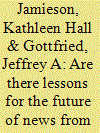

|
|
|
| 2 |
ID:
186801
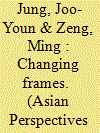

|
|
|
|
|
| Summary/Abstract |
In the People's Republic of China (PRC), the Chinese Communist Party (CCP) has remained stable despite frequent popular protests. Focusing on environmental protests, we attempt to explain how the CCP has utilized domestic news media to deal with protests and ensure regime stability. We chose five major protests against Para-Xylene (PX) and analyzed all of the People's Daily Online (PDO) articles thereon since 2007. From the Hu Jintao to Xi Jinping governments, PDO's collective portrayal of the anti-PX protests has dramatically changed from a symbol of democratic progress to an impediment to national industrialization and social stability. The systematically orchestrated media framing demonstrates that, instead of indiscriminately suppressing information on protests, the party has deliberately chosen when and what to permit and what images to project onto the protests. This article provides new insights into the CCP's media strategy for popular protest and sheds light on how China's authoritarian regime has maintained political legitimacy and social stability despite a considerable level of public discontent and deepening political oppression.
|
|
|
|
|
|
|
|
|
|
|
|
|
|
|
|
| 3 |
ID:
105578
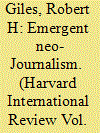

|
|
|
| 4 |
ID:
142049
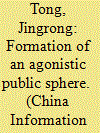

|
|
|
|
|
| Summary/Abstract |
This article discusses the importance of emotions to China’s public life and the way in which the Internet and news media channels have publicized emotional outbursts by the public in China in recent years. An agonistic public sphere is being formed, the basis of which is the expression of emotions, especially hatred, resentment, anger and compassion, both on the Internet and in the news media. As a result, conflicting interests are contested and paradoxes in society are exposed. This development is close to what radical democracy theories conceptualize as an agonistic public sphere. This emotional dimension in public life is a crucial means for China’s subordinated citizens to strive to utilize resources to change the current hierarchy in society. The formation of an agonistic public sphere democratizes communication processes, opens a space for public participation and gives voice to the public who are otherwise silent. The expression of emotions has the potential to break down the Chinese Communist Party’s hegemony.
|
|
|
|
|
|
|
|
|
|
|
|
|
|
|
|
| 5 |
ID:
095216
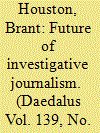

|
|
|
| 6 |
ID:
095218
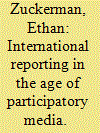

|
|
|
| 7 |
ID:
095211
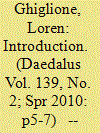

|
|
|
| 8 |
ID:
126263
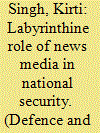

|
|
|
|
|
| Publication |
2013.
|
| Summary/Abstract |
News journalism achieved a new height with the publication of serious revelation made by American computer professional and ex-Central Intelligence Agency (CIA) and National Security Agency (NSA) employee , Edward Joseph Snowden on June 2013. Refreshing the memories of editor-in-chief and founder of Wikileaks, Julian Paul Assange, the recent example has once again exhibited how powerful and deadly the media can be in term of national security. The recent issue has once ignited the same debate on the role of the media: the media as a watchdog of a nation or a medium which provides a voice to the unheard, helps the whistleblowers to expose the cracks in our existing society and by doing so, performs a greater good for the public.
|
|
|
|
|
|
|
|
|
|
|
|
|
|
|
|
| 9 |
ID:
098159
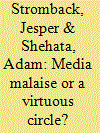

|
|
|
|
|
| Publication |
2010.
|
| Summary/Abstract |
Being politically interested is one of the most important norms from a democratic perspective, as it is a crucial antecedent for voting, political knowledge, civic and political participation, and attentiveness to political information. However, only limited research has focused on the relationship between media use and political interest, despite the notion that modern politics is mediated politics. Even more important is the fact that the causal relationship between media use and political interest still has not been firmly established. Against this background, the purpose of this study is to investigate the causal relationship between news media use and political interest. The results show that there are indeed causal and reciprocal relationships between political interest and attention to political news, and between political interest and exposure to some, but not all, news media. Overall these results lend stronger support to the perspective of media mobilisation theories than media malaise theories.
|
|
|
|
|
|
|
|
|
|
|
|
|
|
|
|
| 10 |
ID:
095212
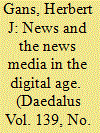

|
|
|
| 11 |
ID:
107662
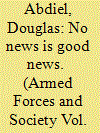

|
|
|
|
|
| Publication |
2011.
|
| Summary/Abstract |
The Australian government and military have maintained humanitarian interventions for far longer than any comparable U.S. humanitarian intervention. This longevity confounds most traditional international relations theories. It seems that the key variable is public support for humanitarian interventions. The U.S. public quickly grew impatient with humanitarian operations, while the Australian public has not yet done so. Two reasons for the Australian public's forbearance are explored. First, the idea that the Australian military and government are proficient at these operations and that the public supports these operations because it "loves a winner" is found wanting. Second, innate differences between the United States and Australia, particularly regarding news media, are explored; these differences seem to be highly correlated with the longevity of the operations. It seems likely that the Australian public does not hear enough about these operations to be concerned about them or question their utility, efficacy, or cost.
|
|
|
|
|
|
|
|
|
|
|
|
|
|
|
|
| 12 |
ID:
080629
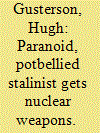

|
|
|
|
|
| Publication |
2008.
|
| Summary/Abstract |
Mainstream American print media coverage of North Korea's nuclear weapons program has been deeply flawed, a reality that skews policy debates and confuses public perceptions. Even simple factual descriptions of the parties' obligations under the 1994 Agreed Framework have often been inconsistent and partial, informing readers about North Korea's obligations more than U.S. obligations, and rarely acknowledging U.S. failures. The media repeated allegations about an illicit North Korean uranium enrichment program based largely on anonymous sources, who made what seem now to have been misleading statements. Journalists rely for comment on administration officials or members of Washington think tanks, while making little effort to gather opinions from academics, those on the left (as opposed to centrist liberals), or experts in Southeast Asia. Journalists also frequently present Kim Jong Il in ways that erase the Korean perspective on U.S.-Korean relations. Accurate, nuanced coverage of events on the Korean Peninsula is vital in producing an informed public and a policy-making process that is judicious, supple, and intelligent. This article concludes with various ways in which the media could better report on North Korea
|
|
|
|
|
|
|
|
|
|
|
|
|
|
|
|
| 13 |
ID:
080876
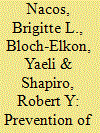

|
|
|
|
|
| Publication |
2008.
|
| Summary/Abstract |
This study finds that the issue of preventing terrorist attacks has received surprisingly little attention by decision-makers and the news media, and only sporadic interest by pollsters. When it comes to homeland security, how to protect the nation and its people from actual attacks takes a back seat to press coverage of threats and other aspects of terrorism, particularly the administration's arguments for fighting the "war on terrorism" abroad as a means to prevent further terrorism at home. This inattention to the difficult task of preventing further catastrophic terror attacks by taking measures at home may affect the nation's vigilance as time has passed since 9/11.
|
|
|
|
|
|
|
|
|
|
|
|
|
|
|
|
| 14 |
ID:
105582
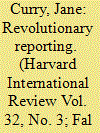

|
|
|
| 15 |
ID:
168959
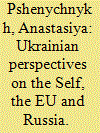

|
|
|
|
|
| Summary/Abstract |
This paper contributes to our understanding of EU-Ukraine relations by examining intersemiotic communication – how words and images, or verbal and photographic semiotic layers and their interaction, combine in the representation of international affairs. The analysis focuses on Ukraine’s perspectives of Self, the EU and Russia as presented in Ukrainian media discourse, namely, in leading Ukrainian social and political newspapers (January-June, 2016). The article presents the results of applying the cognitive theory of perspectives to research the intersemiotic and mental image of Self and Other in four aspects: a vantage point, direction of scanning, perspectival distance, and perspectival mode. Based on that, I explain the main strategic narrative of the Ukrainian press about the EU, how it is sustained, and how the image of the EU becomes pronounced.
|
|
|
|
|
|
|
|
|
|
|
|
|
|
|
|
| 16 |
ID:
112507
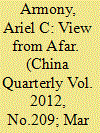

|
|
|
|
|
| Publication |
2012.
|
| Summary/Abstract |
The fast-paced landing of China in Latin America raises the question of how such a complex relationship is being built from little previous contact. Focusing on Colombia's printed media, the article examines the construction of China's public image. A Janus-faced view of China is initially revealed: a growing power perceived as an auspicious trade partner on the one hand; a troubling new actor in the international context on the other. Further analysis shows shades of grey that reveal a multifaceted, continuously evolving image of China that tells us much about both countries. The depiction of China's rising power, whose direction and purpose suggest a paradigm of "modernity without enlightment," brings light to Colombia's unsettled accounts with democracy and development. The article sets a launching pad for further research on such mutually constitutive relationships.
|
|
|
|
|
|
|
|
|
|
|
|
|
|
|
|
| 17 |
ID:
067749
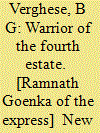

|
|
|
|
|
| Publication |
New Delhi, Penguin Books, 2005.
|
| Description |
xviii, 342p.
|
| Standard Number |
0670058424
|
|
|
|
|
|
|
|
|
|
|
|
Copies: C:1/I:0,R:0,Q:0
Circulation
| Accession# | Call# | Current Location | Status | Policy | Location |
| 050720 | 070.092/VER 050720 | Main | On Shelf | General | |
|
|
|
|
| 18 |
ID:
113869
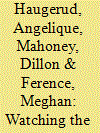

|
|
|
|
|
| Publication |
2012.
|
| Summary/Abstract |
Global distribution of a popular American television programme - Jon Stewart's Daily Show - offers a rare opportunity to examine transnational contingencies of meaning in political satire. Drawing on focus group discussions in Kenya, this analysis shows how some East Africans appropriated and reinterpreted - indeed unexpectedly subverted - The Daily Show's political content, deriving from it insights that Stewart himself might have found surprising. Kenyan viewers perceived in The Daily Show gaps between the rhetoric and reality of empire and pointed to limitations of Stewart's dissident satire as they rejected its depictions of non-wealthy nations and marginalized peoples. They reconfigured Daily Show episodes as commentaries on global power relations; reflected critically on Kenyan politics, media and their own political subjectivities; and revised their own earlier assumptions about the gap between Africa and supposedly 'mature' democracies such as the United States. Thus, American political satire such as The Daily Show can activate in foreign audiences new perceptions of differences between the 'West' and the rest and new forms of political imagination.
|
|
|
|
|
|
|
|
|
|
|
|
|
|
|
|
| 19 |
ID:
192943
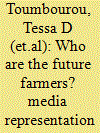

|
|
|
|
|
| Summary/Abstract |
In Indonesia, state and non-state actors frame youth attrition from agriculture as a food security concern and propose policy solutions focused on ‘modern’ farming techniques. Using a critical framing analysis of five national Indonesian news media sources from 2010 to 2020, we examine how government, development and private sector actors portray youth in agriculture, and the underlying assumptions that inform related policy and development agendas. Our analysis reveals contrasting portrayals of youth in agriculture. Youth are often depicted as averse to farming, while also being innovative adopters of modern farming techniques, equipment, and digital technologies. We argue that media frames reflect and reinforce the dominant discourses of state and non-state actors, which have a productivist orientation, proposing technical, capital-intensive agricultural solutions to food insecurity and related issues. News media pays comparatively less attention to structural barriers to youth entry and success in agriculture, such as limited access to land and finance and unfavourable terms of trade.
|
|
|
|
|
|
|
|
|
|
|
|
|
|
|
|
|
|
|
|
|